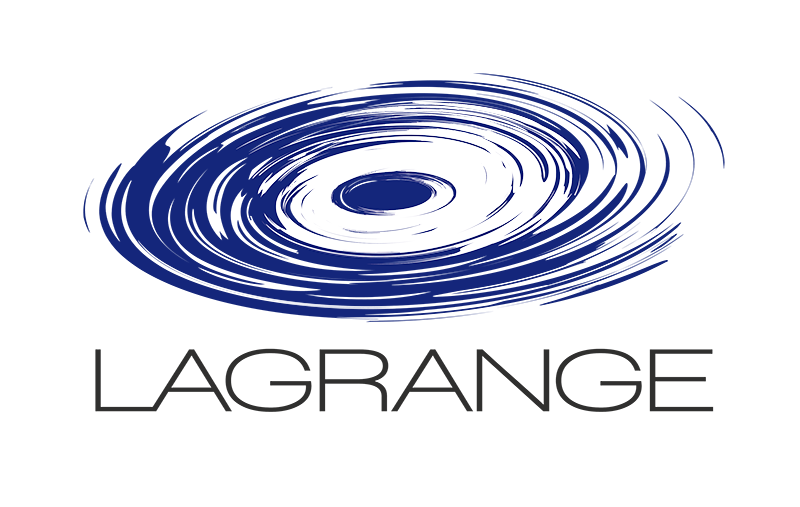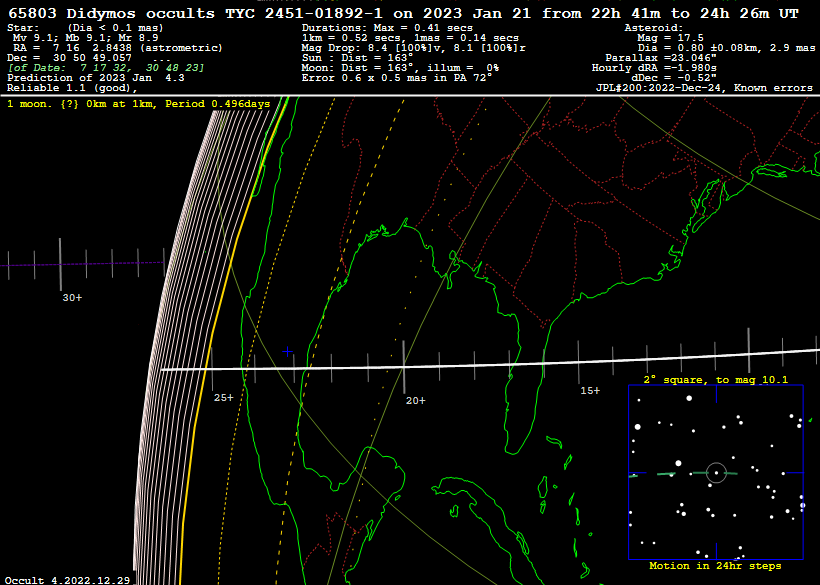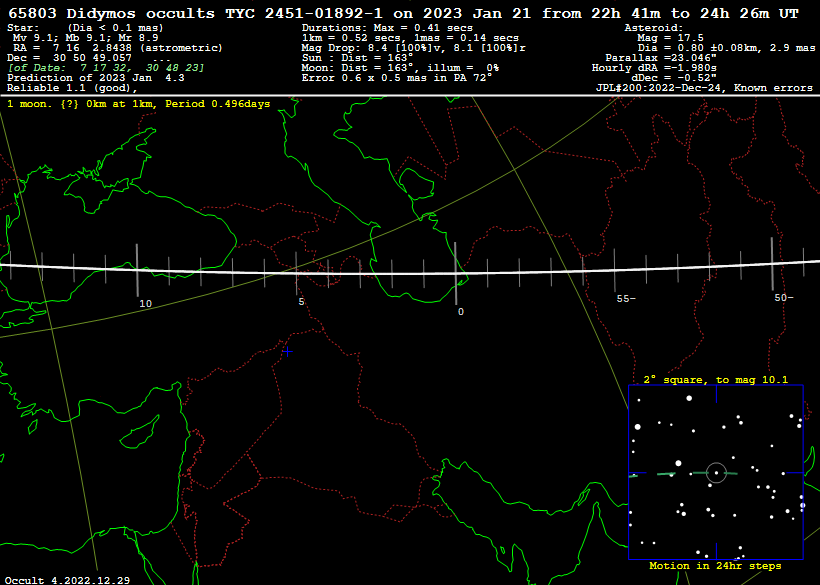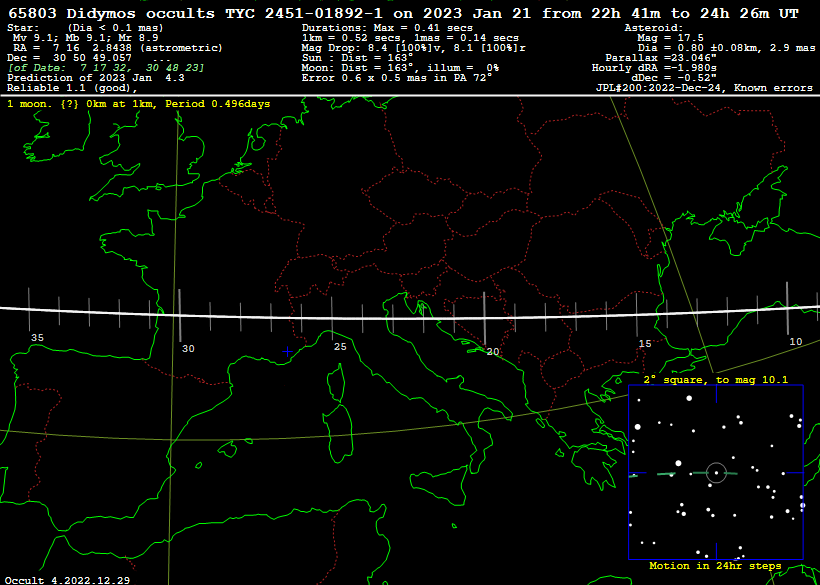Blog
2024 Didymos occultation campaigns in Australia and New Zealand
- Détails
Efforts lead by the France-Greece 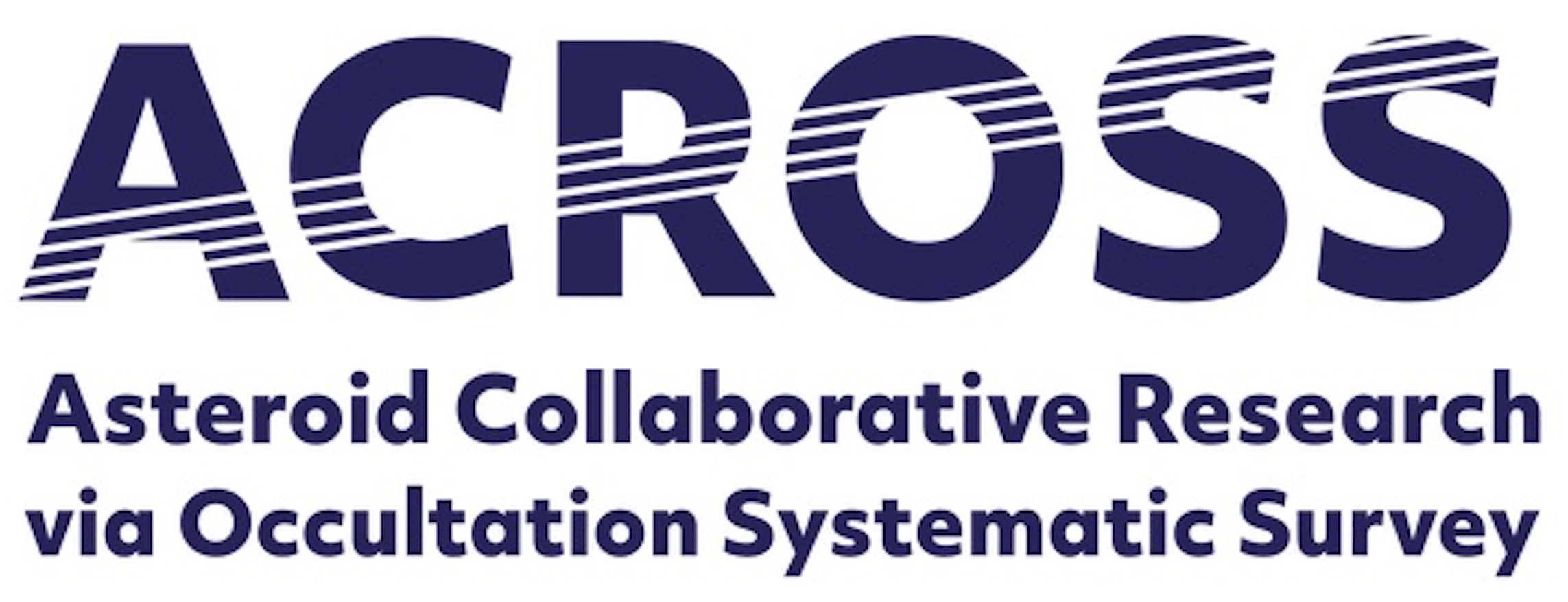 collaboration to support the Hera (
collaboration to support the Hera (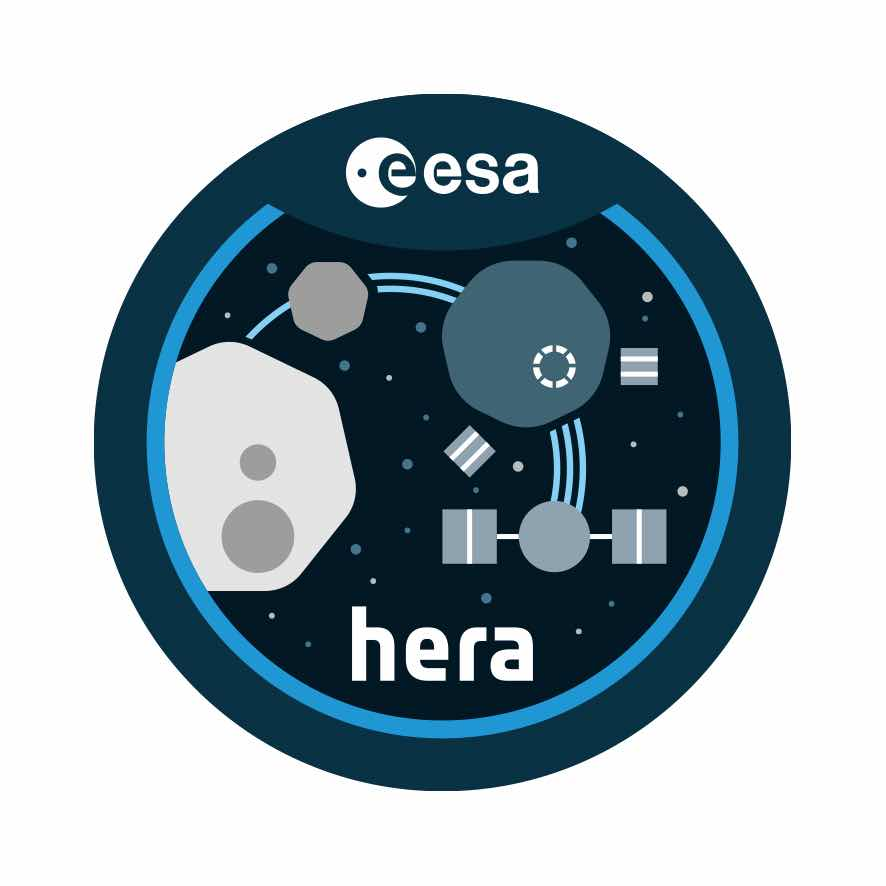 ) (ESA) mission
) (ESA) mission
Call for observers/ Collaborators
Check out the events of Didymos on 2024-05-05, 2024-05-31, 2024-06-05, 2024-07-12 , 2024-08-10 , 2024-08-13 2024-08-26 and complete the participation form
This is a call for observers mainly addressed to the membership of the Astronomical Society of Australia. The best of 2024 Didymos occultation events will be observable from the Southern hemisphere, mainly across Australia, hence this call for observers across the country.
Each observer, each institution is considered as a collaborator and is therefore a co-author to the scientific paper (unless they object to it).
In return, we ask that you communicate your results to us and not post them on social media (in order to preserve the integrity of the science).
While these observations might seem challenging at first glance, the feasibility of the observation is guaranteed as we recorded in collaboration with our partners (IOTA, IOTA-ES, and JOIN), 20 successful occultations between Oct. 2022 and March 2023 (papers in preparation).
As we are in a period that favours observations of Didymos occultations, we can expect to receive new data that will improve our knowledge of Didymos. Τherefore as we get closer to the events we recommend you check our ACROSS website and Occult Watcher Cloud (OWC, ACROSS -feed) for most recent updates.
Our partners (across the globe)
- IOTA: International Occultation Timing Association
- IOTA-ES: International Occultation Timing Association - European Section
- JOIN: Japan Occultation Information Network (now part of IOTA-East Asia)
- TTOA: Trans-Tasman Occultation Alliance (which is much smaller in membership and includes observers
from Australia and New Zealand).
- the Unistellar network.
Background
The HERA mission, set for launch in October 2024, is part of the AIDA planetary defense program and will explore the Didymos-Dimorphos asteroid system, studying the impact caused by NASA's DART kinetic impactor. ACROSS aims to improve astrometry and measure the size of the Didymos-Dimorphos system, aiding the Hera mission in determining the system's orbit and momentum transfer from the DART impact. Stellar occultations, when a star is briefly obscured by a passing object, provide valuable data on the object's size, shape, and astrometry. ACROSS leverages Gaia's stellar catalog to predict occultations by small NEAs, supporting missions like DART and HERA. However, occultations by NEAs pose challenges due to their small size, short duration, fast movement, and sensitivity to Earth's topography, requiring careful coordination of observers.
This article summarises the best Didymos 2024 events observable from Australia, updates on each event will be posted as on our ACROSS website and on the Occult Watcher Cloud (OWC, ACROSS-feed), as we get closer to the events and improve the accuracy of the prediction.
The Very Best Events
Events in this category, for which we could have a possible occultation by both components, will also be highlighted on OWC, as we approach the event’s date and links to interactive sky charts will also be given.
Table1 : The four very best events.the table gives basic information about the events: epoch, the star’s G magnitudes, the maximum expected duration and expected mag. drop, the geographic regions crossed, a hyperlink to the FoV centred around the occulted star and finally a .kmz file with the amp of the predicted path including topographic corrections. The label used in the sky chart column for a given event is the same as on the map (Fig. 1)
| Epoch (UT) | Star’s G mag | Max. duration | max. drop | geografic region | sky chart | Map, topografic corrections |
| 2024-05-31 T15:22 | 11.8 | 0.21s | 6.43 | QLD, NT, SA, WA | (a) | (a) |
| 2024-08-10 T09:37 | 11 | 0.40s | 5.87 | NSW, VIC, SA | (b) | (b) |
| 2024-08-13 T13:02 | 6.7 | 0.74s | 9.47 | QLD, SA, WA | (c) | (c) |
| 2024-08-26 T13:38 | 11.4 | 0.29s | 6.03 | NSW, VIC, SA | (d) | (d) |
Figure 1: Map showing the projected path for the best observable events given in Table 1.
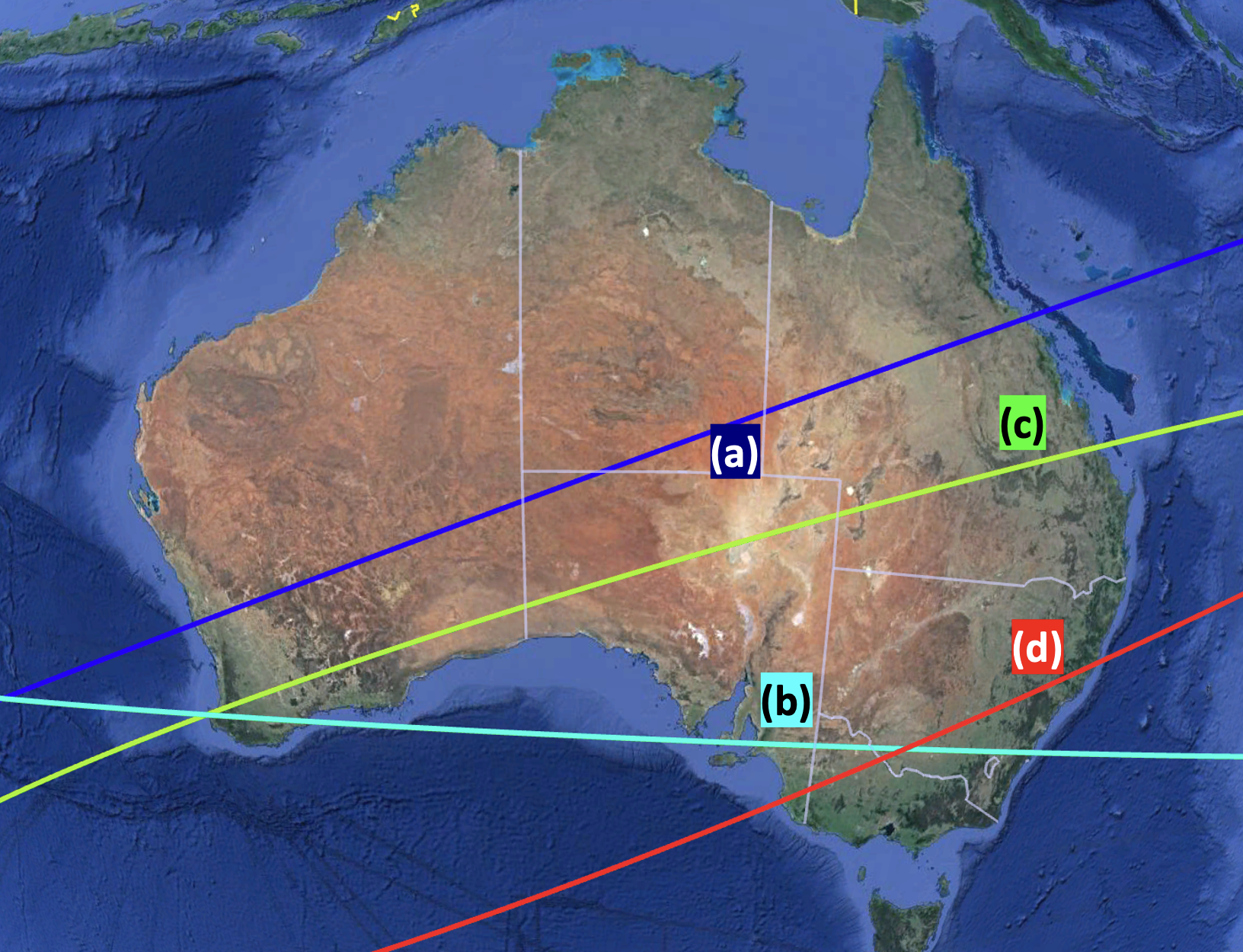
Events for the Most Experienced Observers and for Practice
Table2 : Events for the most experienced observers and/or for good practice: epoch, the star’s G magnitudes, the maximum expected duration and expected mag. drop, the geographic regions crossed, a hyperlink to the FoV centred around the occulted star and finally a .kmz file with the amp of the predicted path including topographic corrections. The label used in the sky chart column for a given event is the same as on the map (Fig. 2)
| Epoch (UT) | Star’s G mag | Max. duration | max. drop | geografic region | sky chart | Map, topografic corrections |
| 2024-05-05 T15:25 | 10.9 | 0.17s | 8.62 | (VIC, SA, WA), & (NZ) | (e) | (e) |
| 2024-06-05 T16:26 | 12 | 0.16s | 6.35 | QLD, SA | (f) | (f) |
Figure 2: Map showing the projected path for the best observable events given in Table 2.
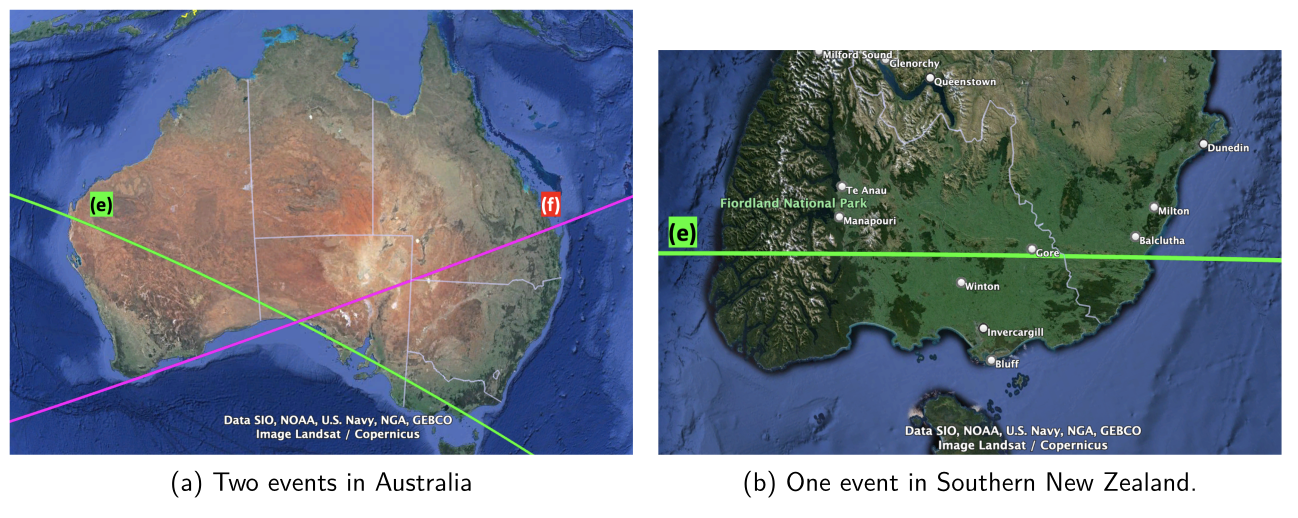
Events for those looking for challenges
Table3 :Much more challenging event:
| Epoch (UT) | Star’s G mag | Max. duration | max. drop | geografic region | sky chart | Map, topografic corrections |
| 2024-07-12 | 10.4 | 0.09s | 7.47 | QLD, NT, WA | (g) | (g) |
Figure 3: Map showing the projected path for the best observable events given in Table 3.
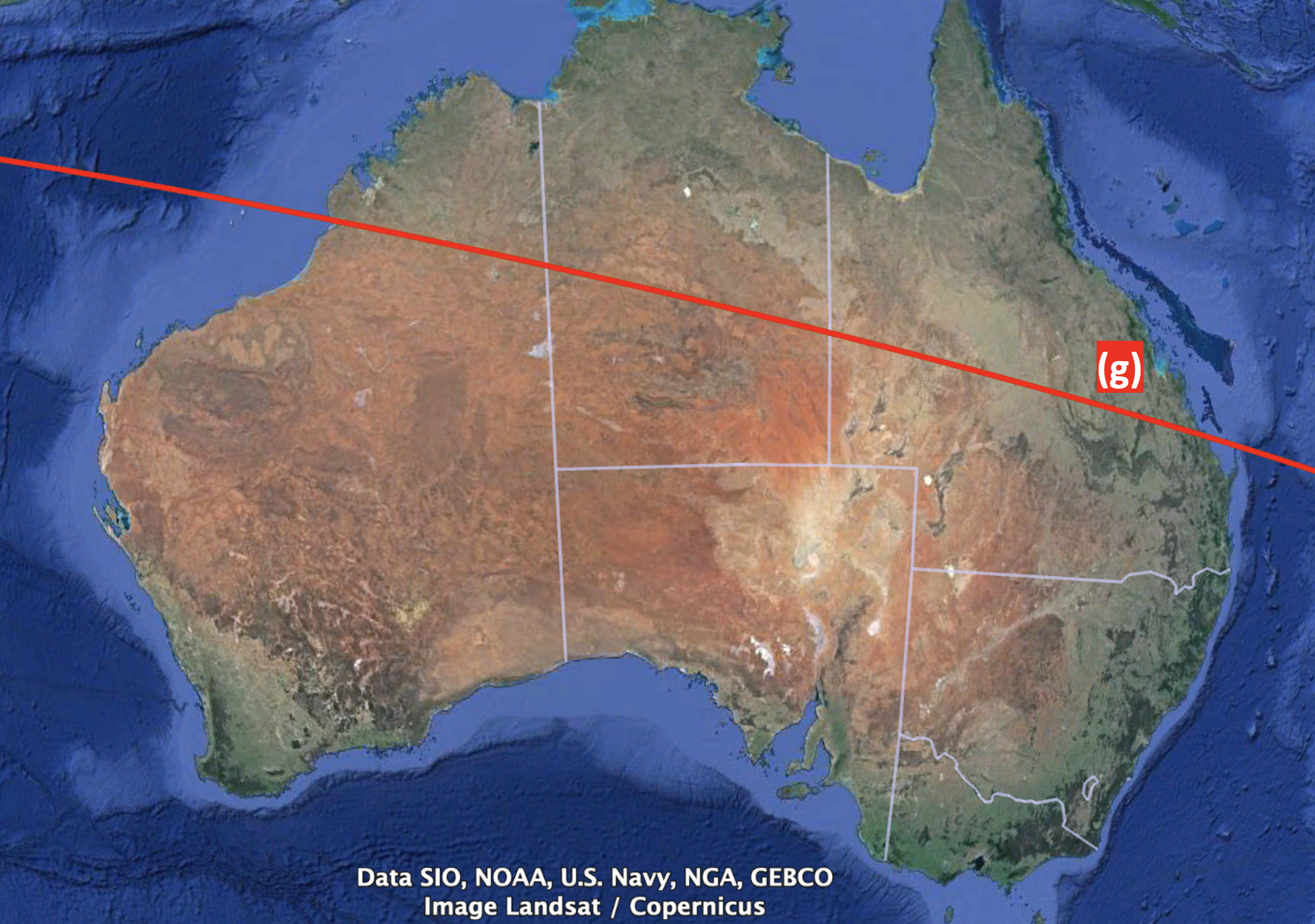
Gear Requirements
You will need mobile telescopes, if you are off the path by 500m, and you are not mobile ...
• Timing requirements: GPS timing accuracy is by-far the most reliable, as the timing uncertainty cannot be larger than (or equivalent the exposure) time.
→ The 1a solution: use of cameras with integrated GPS antennas is by far the best option.
→ The 1b solution: time-boxes if you can (external GPS antenna, practice, practice, practice),
→ The second best is NTP synchronisation of your computer clock,
→ an alternative solution to be explored depending in your equipment is the use of a chronoflash.
• Telescope’s aperture: for the brightest events, small aperture scopes can be used (here again
depending on your instrumental setup).
• Frame acquisition rate: depending on the event, we would suggest at least 33Hz, however tests
must be made
Other recommendations
Practice on the field, practice on the field, practice on the field ...
→ Identify the FoV: while the field of view seems dense, exposing a couple of seconds will be enough (depending on your instrumental setup) for you to confirm that you are on the field.
→ Test your equipment and understand its limitations on sky
→ Charge your batteries, and do not let your laptop and other devices run for hours before the event
→ Do not get too comfortable in your practice, always expect a challenge (just like in Tennis, where you would play every single serve as if it were the last one).
→ Test your equipment to find the most optimal exposure time, an SNR of ∼5 on the occulted star is enough.
→ if you are seeing ”sharply” the star (especially for the very bright ones), then you are definitely ”over-exposing”
→ Test your own equipment, only you can determine the most optimal setting for your telescope, camera ...
→ Identify the USB-3 port on your laptop, and always use it to plug the camera. Here again, only tests will reveal to you possible buffering issues that will result in the loss of frames.
→ Do not use any optical filter.
The campaigns
Coordination and deployment for the campaigns
• When it comes to occultations by very small objects, coordinating the deployment on the ground is very important. Indeed depending on the number of registered observers per event, we will assigne observingchords to observing (accounting for the local topographical constraints). The goal is to ensure the most optimal coverage and to have nearly equidistant ”chords” in the plane of the sky. This work is done within a few days of the events, once we have locked the last orbital solution, and once we know the number of observers on the ground.
In order to get organised and better coordinate the events, we ask observers to complete the following
online form, so that we can contact you as we are approaching the event.
Collecting the data
• The data (original recordings) and observational reports must be sent within a week (at most from the
event), so that we can update predictions for the future events.
To collect the data efficiently, and to keep records of everyone’s contribution, we urge each observer to
submit their data and complete the report on our Occultation Portal.
Didymos occultation of a 9-mag star on January 21-22, 2023
- Détails
Didymos and his satellite Dimorphos will occult a bright (9th magnitude) star on January 21, 23:30 UT (for Europe). The star, in Gemini, will be at very high elevation in Europe (70-75 degrees). The event is relatively "slow" (0.38 s max duration).
Prediction accuracy is really excellent and observers can be confident that they will get a result. A maximum cross-track displacement of about 200 m could be present, a very reasonable uncertainty for an object that is 860 km in maximum diameter. A great opportunity to better refine its shape!
Path views
General view of the path (from Asia to Mexico) with main occultation data (orbit JPL #200, update with occultation astrometry obtained in December 2022) :
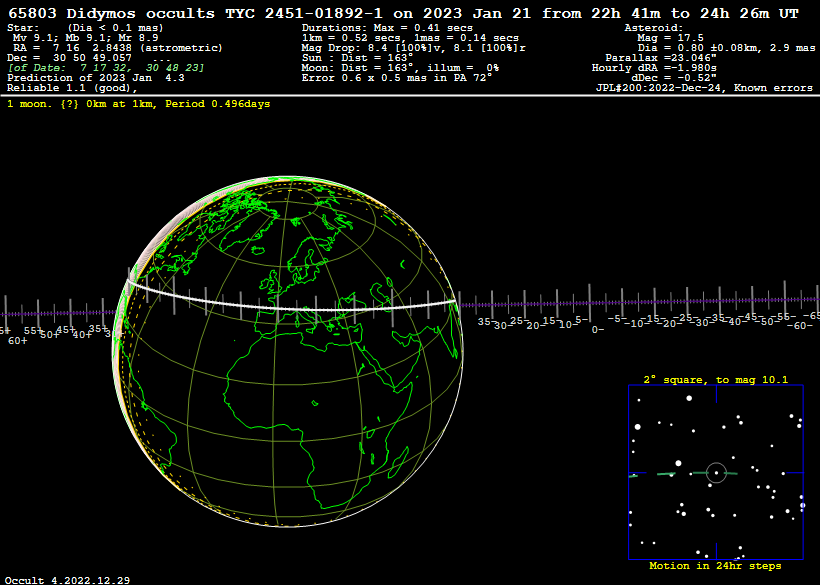
Zoom on different areas of the path (click for full size version):
Detailed path corrected for elevation, with fence lines
Please see it online here, with topography corrections, based on JPL orbit s201. With respect to the previous version there is a ~200 m cross-track shift for the event, towards North. This is NOT a major shift (about 1/4 the size of the object), and must be CONFIRMED by observing this additional event. Fence line to cover and time tags are also indicated (click on the round tag to obtain local information). There are more FENCE LINES to the South, in order to cover a possible South shift compatible with the previous orbit solution.
REGISTER to choose your preferred fence line in this spreadsheet.
If all fence lines are taken:
- Duplicate coverage of same fence lines is useful, especially if well separated in longitude (to avoid as much as possible weather issues).
- Intermediate positions between fence lines are also useful, in particular close to the central portion of the path, where also Dimorphos could be observed (with fast enough frame rates).
DO NOT REFER TO THE PATH IN OWC, NOT CORRECTED FOR TOPOGRAPHY.
Finding charts
Use those on OWC (top of the page, close to the star image, links to Aladdin) but NOT the path shown there (see above): https://cloud.occultwatcher.net/event/750-65803-103092-649936-T01892-1#
Position of Dimorphos
During the event, the positions of Dimorphos will be as illustrated below (for two populated areas, well separated along the path: Orlando/Florida and Toulouse/France. Courtesy S. Chesley, JPL).
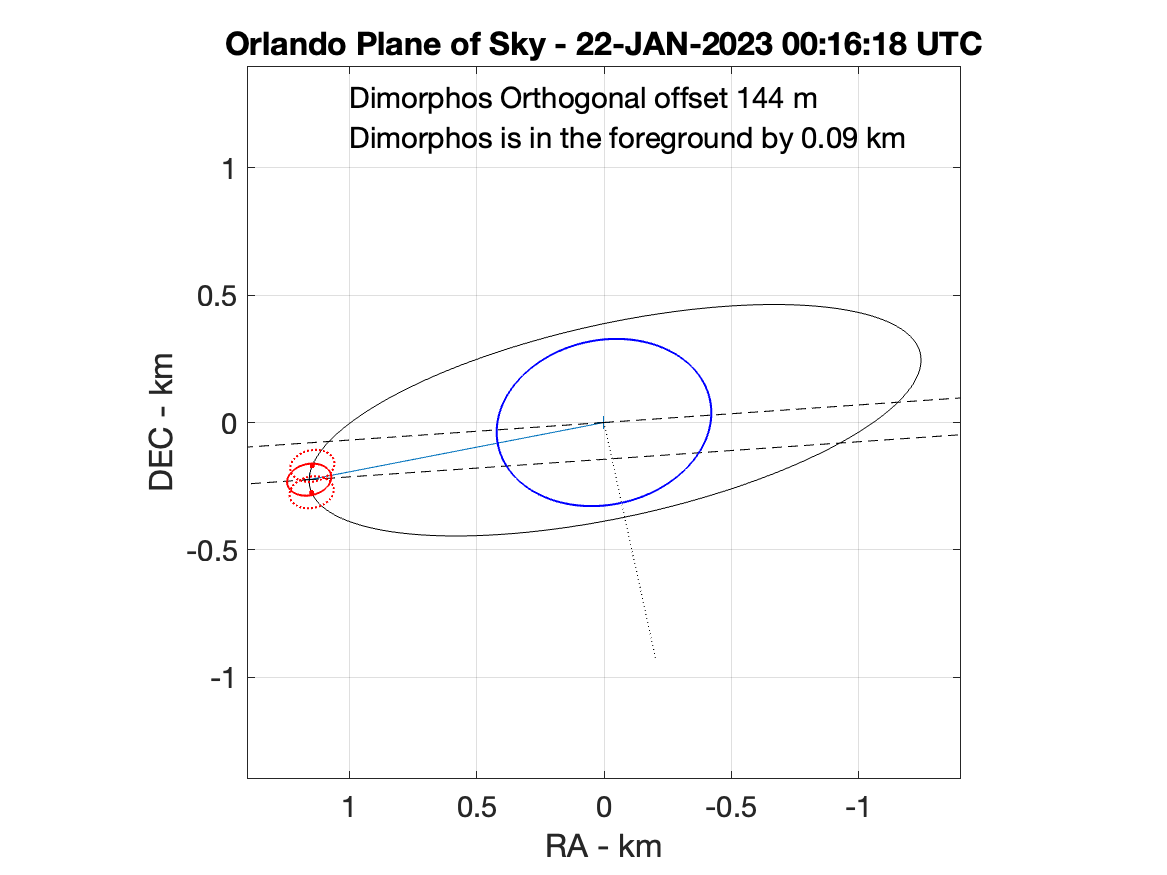
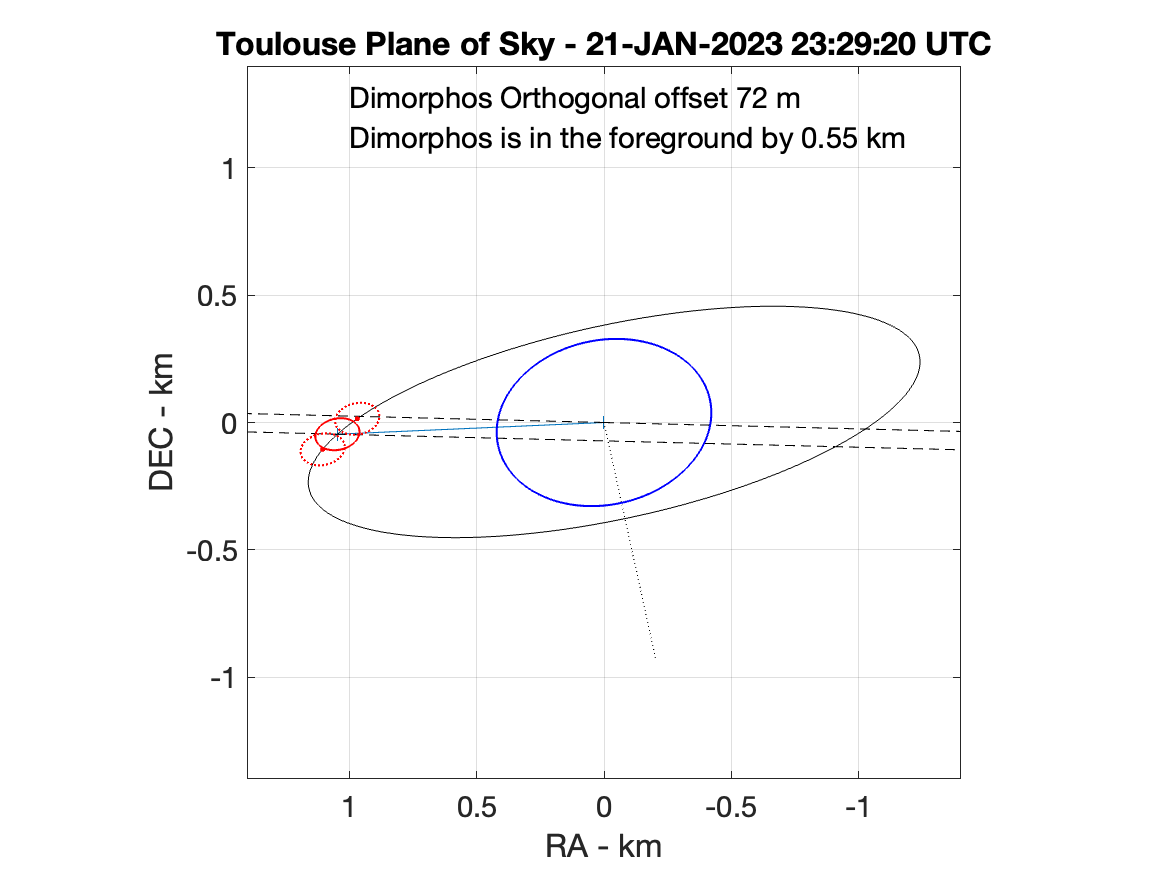
The path of the star relative to the asteroid is represented by the dashed lines in the background. As you can see on these diagrams, observers that "see" the event by Didymos could also catch the secondary event by Dimorphos which will be much shorter (max 0.07 s). The uncertainty of the position of Dimorphos along the orbit is represented by the three positions in red, but it could also be larger (nearly double).
ACROSS on the Occultation Portal
- Détails
Observers are invited to register and review the Occultation Portal (https://occultation.tug.tubitak.gov.tr) where the high priority events among our predictions are also accessible. Use Occultation Portal to provide your results! Note that the full list of other more difficult events are still available only in the files that can be downloaded from the ACROSS web site,"predictions" page.
Update on OWC Predictions
- Détails
We have recently updated our predictions of NEA occultations both on our website (https://lagrange.oca.eu/fr/prediction) and in OccultWatcher (https://cloud.occultwatcher.net/events/campaign/ACROSS). For the first set, February and March, we failed to account that a lot of events would not be observable in any landmass, resulting in flooding OccultWatcher with unusable occultations. Steps were taken to make sure this doesn't happen, and the feeds for April and May were filtered to only include events with viable observability. The unfiltered sets of predictions can still be found on our website.
At the end of each month, we will be updating our predictions on both sources, and we will send a reminder for anyone interested to participate in our campaigns. For now, the visible events are those for April and May.
Comparison of DIAMONDS and SORA routines for Astrometry
- Détails
After a lightcurve is obtained, it is necessary to convert it into the astrometric data of the asteroid, which will then be used to refine the asteroid’s orbit. Here we compare the results obained by the open source SORA astrometry module, to the approach based on the bayesian model sampler DIAMONDS.
UMR LAGRANGE
Observatoire de la Côte d’Azur
Boulevard de l’Observatoire
CS 34229 - F 06304 NICE Cedex 4
Tél. : +33 (0)4 92 00 30 11
Fax : +33 (0)4 92 00 30 33
